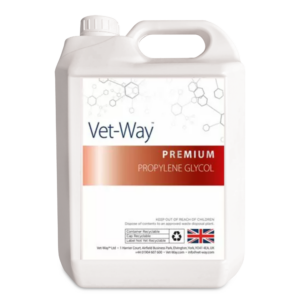Latest Blogs
The Use of Propylene Glycol in Large Animal Veterinary Practice
The Use of Propylene Glycol in Large Animal Veterinary Practice
Introduction
Propylene Glycol (PG) is a widely used compound in veterinary medicine, particularly within large animal practices in the UK. Its applications range from acting as a solvent for various medications to serving as an energy source and stabiliser in animal feeds. Understanding the role of Propylene Glycol is essential for veterinarians and livestock producers alike, as it can have a significantly positive impact on animal health and productivity.
What is Propylene Glycol?
Propylene glycol (PG) is a colourless, odourless, and tasteless liquid that is widely accepted in both human and veterinary medicine. It is a synthetic compound derived from petroleum products, but it is easily metabolised by the body to produce energy. In the context of veterinary medicine, PG is used for its unique properties, including its ability to dissolve certain medications and its positive role in the metabolic processes.

Applications in Large Animal Practice
1. Nutritional Supplementation
In large animal nutrition, propylene glycol is often used as an energy source, particularly in ruminants such as cattle and sheep. During periods of high energy demand such as late gestation, lactation, or recovery from illness PG can be administered to prevent ketosis and support overall energy balance. This is particularly crucial for high-producing dairy cows, where the risk of metabolic disorders increases.
2. Medication Solvent
Propylene Glycol serves as an effective solvent for various medications, enhancing their bioavailability. This is particularly important in injectable formulations for large animals, where solubility can directly affect the efficacy of the treatment. By utilising PG as a carrier, vets can ensure that medications are administered in optimal concentrations.
3. Hydration and Electrolyte Balance
In cases of dehydration or electrolyte imbalance, propylene glycol can be used in oral rehydration solutions. It helps maintain hydration and provides a quick source of energy, making it a valuable tool in managing conditions such as diarrhoea or after surgical procedures.
Safety and Regulations
While PropyleneGlycol is considered safe for use in veterinary medicine, it is crucial for practitioners to adhere to recommended dosages and guidelines established by regulatory bodies, such as the Veterinary Medicines Directorate (VMD) in the UK. Overuse or incorrect administration can lead to adverse effects, including metabolic disturbances.
Veterinary professionals should also be aware of potential allergic reactions in individual animals, although these occurrences are rare. Regular monitoring and adherence to veterinary protocols can mitigate risks associated with PG use.

Vet Way’s Propylene Glycol Product Range
Vet Way® Ltd have been distributing a premium range of Propylene Glycol for over 20 years. We collaborate with UK manufacturing partners, laboratories, and raw material suppliers to ensure that this product range not only meet rigorous quality standards but also contribute positively to the environment. Our focus on batch traceability for all formulations exemplify our commitment to responsible manufacturing practices. Vet Way® support the use of a recyclable packaging with a full range of container sizes from 500ml to 25 Litres, a range that will satisfy the requirements of many professionals working within the animal health industry.
Conclusion
Propylene Glycol plays a vital role in large animal veterinary practice in the UK, offering numerous benefits in nutrition, medication administration, and hydration management. As with any veterinary product, its use must be guided by sound clinical judgment and a thorough understanding of the specific needs of the animals being treated.
At Vet Way®, we are committed to supporting both vets and livestock producers with the latest information and resources regarding safe and effective practices in animal health. By fostering a comprehensive understanding of compounds like Propylene Glycol, we can contribute to better health outcomes for large animals and enhance productivity within the agricultural sector.
This article provides an overview of Propylene Glycol’s applications and considerations in large animal veterinary practice, emphasising its importance and the need for careful management in any animal health setting.